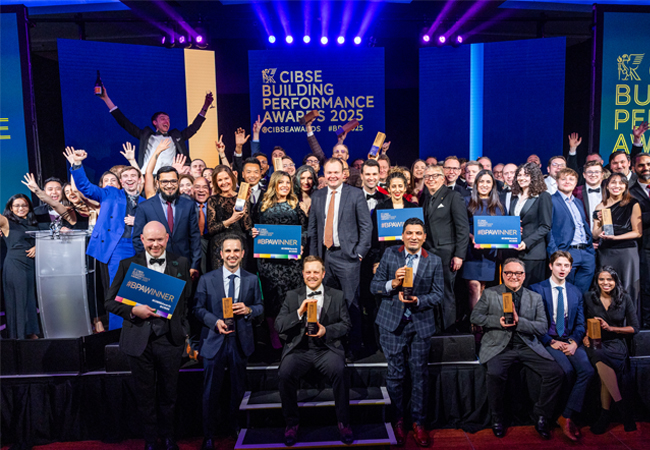
The award winners
Building Performance Champion and Project of the Year – Retrofit Workplaces
Winner: The Entopia Building – Max Fordham, Architype and BDP
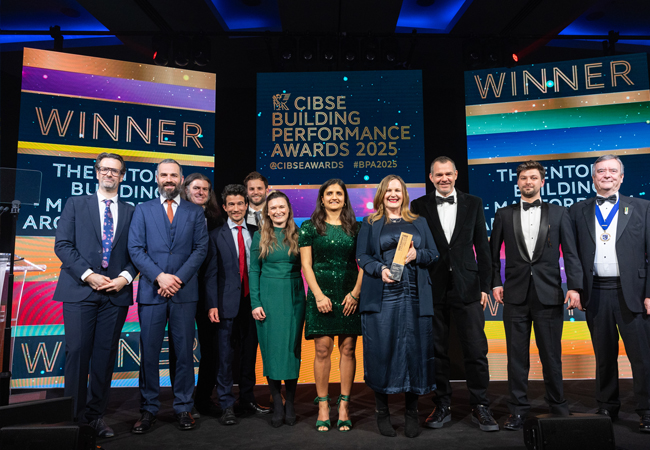
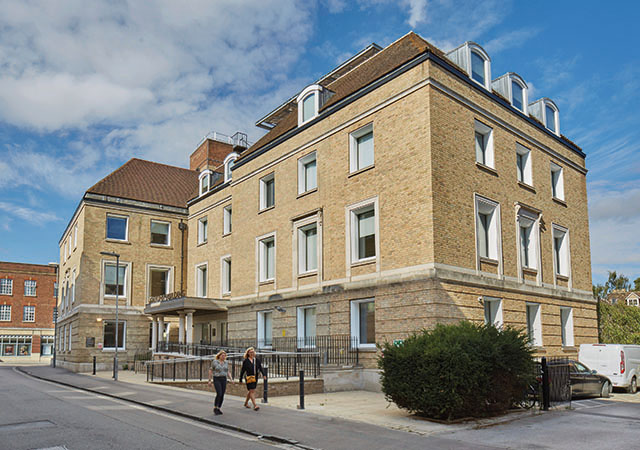
The judges described the whole life building performance of Entopia as exceptional. Despite what they called an ‘incredibly robust and challenging brief’, the winning team delivered an exemplary retrofit of a five-storey 1930s telephone exchange that had levels of performance comparable with a brand-new office building.
The Entopia retrofit shows that, with ingenuity and collaboration, it is possible to deliver healthy, high-performance buildings on a typical refurbishment budget.
‘It’s a great example for others to learn from,’ said the judges, who called the project a trailblazer for large commercial buildings moving to net zero.
The project team achieved high levels of user satisfaction and comfort, as well as outstanding measured building performance. This was exemplified by achieving EnerPHit Classic, Well Gold and Breeam Outstanding standards.
Improving the thermal fabric performance reduced the amount of plant required significantly. A highly efficient MVHR ventilation system maintains thermal comfort, while night-time purge ventilation helps minimise mechanical cooling. A reversible heat pump in the central AHU provides any necessary cooling and mitigates the risk of overheating in future climate scenarios.
The measured energy use intensity of 52kWh·m–² per year compares well with the 75kWh·m–² per year target for 2025 new-build offices, laid out by LETI and RIBA 2030.
The design included careful consideration of whole life carbon, and 48% of materials specified were bio-based.
Project of the Year – Retrofit Workplaces sponsored by Crane Fluid Systems
Engineer of the Year
Sponsor: Ideal Heating Commercial
Winner: Volkan Doda, head of design technologies, Atelier Ten
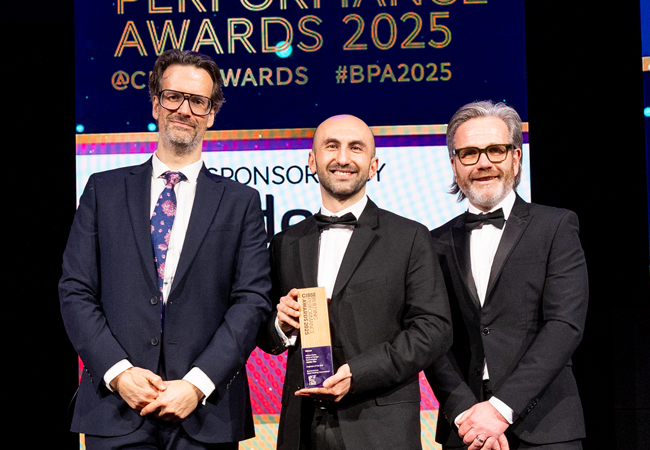
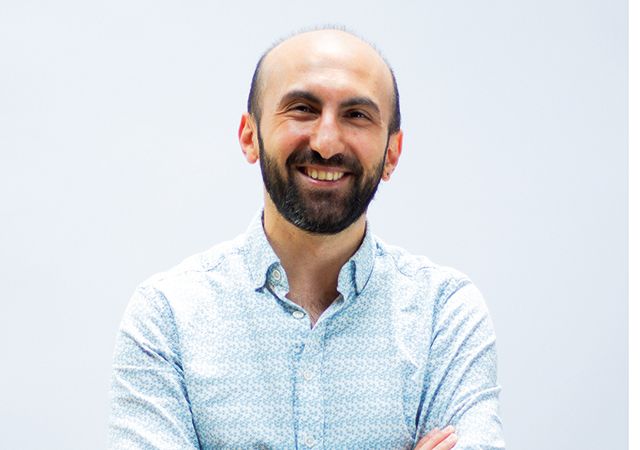
Volkan Doda stood out for his ability to ‘bridge gaps between academia, constant learning and high-performance building design’, said the judges.
Doda combines deep technical knowledge with an ‘empathetic communication style’, they added, translating complex ideas into actionable solutions for clients, collaborators and his team. At Atelier Ten, he leads a culture of collaboration and mentorship through initiatives such as cross-discipline expert practices and weekly knowledge-sharing sessions. Under his leadership, expert practice groups research, develop and embed the latest approaches organisation-wide.
Project of the Year – New-build Workplaces
Sponsor: Crane Fluid Systems
Winner: Globe Point, Temple – Hoare Lea
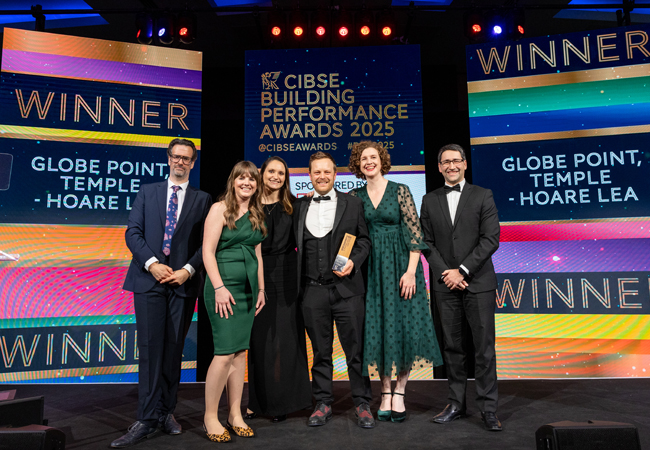
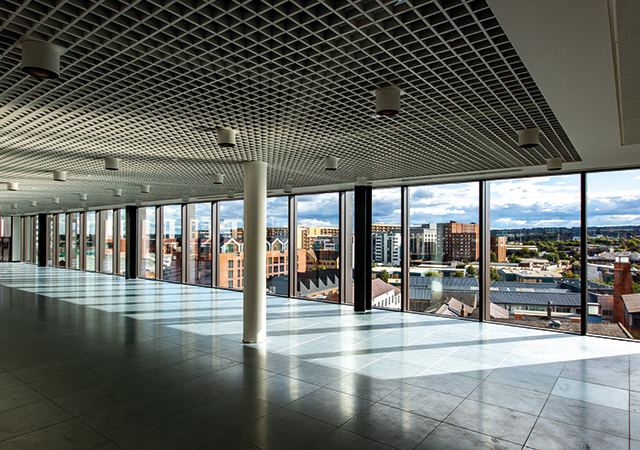
Globe Point is a landmark project in Temple, Leeds, transforming a triangular site into a Grade A office space prioritising sustainability, occupant wellbeing and energy performance. The judges praised Hoare Lea’s ‘ability to demonstrate in-use performance’ – recognised by Well, Nabers and Breeam certifications – and ‘great use of a digital twin to improve energy performance’.
The all-electric Globe Point operates on 100% renewable energy and achieves top sustainability certifications, including Breeam Excellent, Nabers 4.5 stars, and WiredScore Platinum, with a focus on tenant engagement and performance monitoring.
Project of the Year – Portfolio Workplaces
Sponsor: Crane Fluid Systems
Winner: Cathedral Hill Industrial Estate – SRE
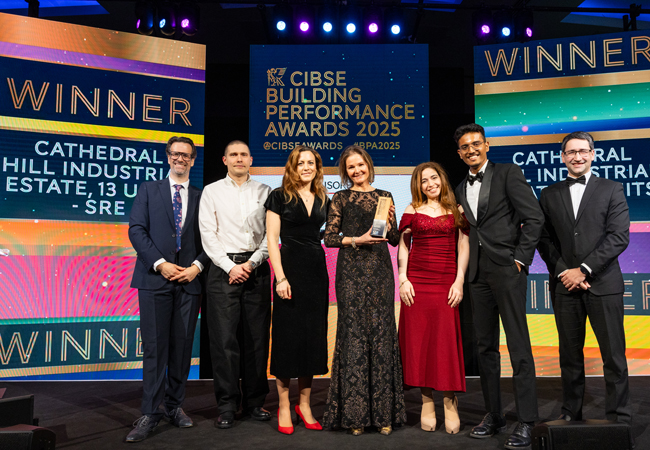
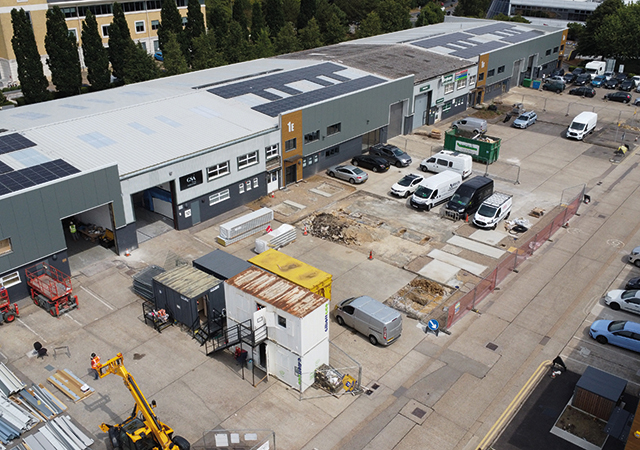
The judges praised the Cathedral Hill Industrial Estate deep retrofit as an ‘outstanding example of how regeneration can benefit businesses and the environment’. Achieving operational net zero, the £10.6m refurbishment increased rental value by 220% and the site is now fully tenanted, with a waiting list.
Improvements included enhanced insulation, heat pumps, Tesla Powerwall batteries for solar energy storage, and sustainable material reuse. The project’s upfront carbon emissions were only 281 kgCO₂ m–² GIA.
Highly commended – Aldar energy retrofit, grfn
Project of the Year – Residential
Sponsor: Crane Fluid Systems
Winner: Agar Grove 1b – Max Fordham
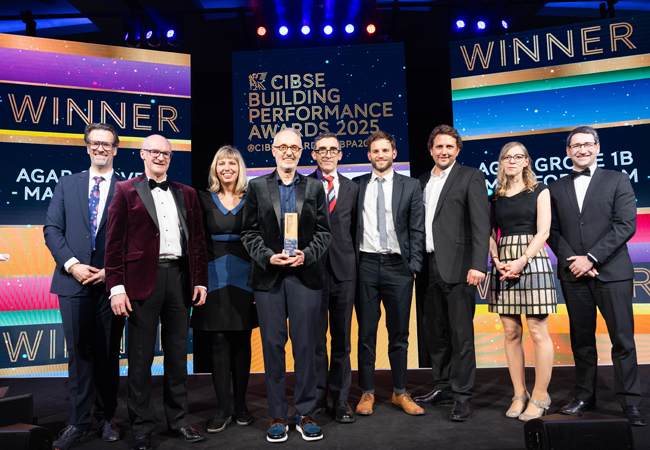
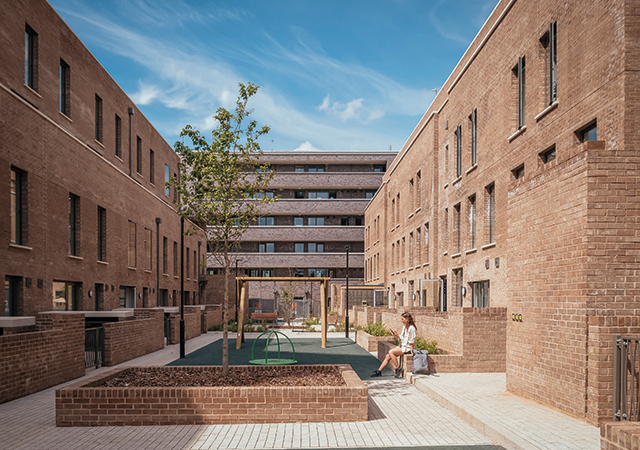
In a competitive field, the judges praised Agar Grove 1b for its exemplary application of design best practice on a large scale. They highlighted the focus on building performance and commitment to the local community. The project, part of the UK’s largest Passivhaus housing scheme, includes 34 council and 23 private homes.
Max Fordham adopted a passive-first M&E design, achieving 70% energy efficiency. The energy source is currently gas, but future plans include heat pumps. Resident surveys showed high satisfaction, and the design considered overheating risks, passive ventilation and noise mitigation for optimal comfort.
Highly commended: Brambles – Bere Architects
Building Performance Consultancy (over 300 employees)
Sponsor: ABB
Winner: AtkinsRéalis
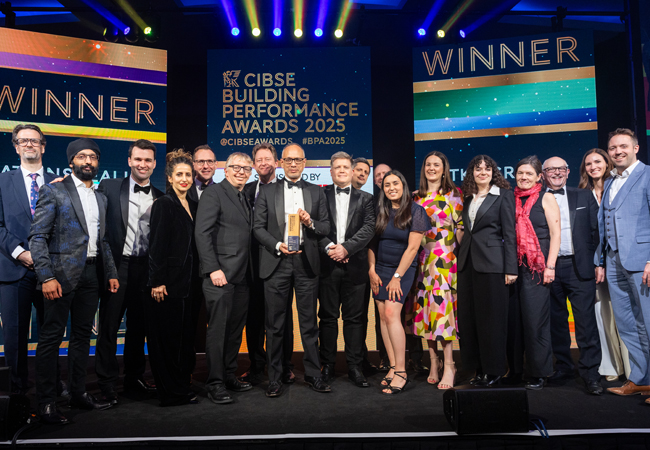
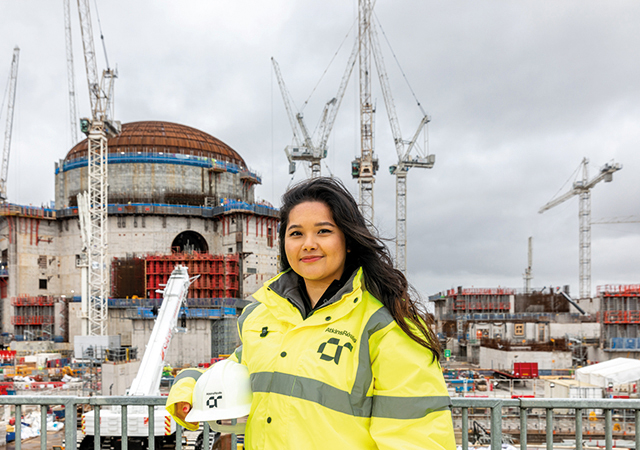
With a focus on decarbonisation and post-occupancy evaluation (POE), AtkinsRéalis won with a ‘very strong entry’. Its decarbonisation tool assessed more than 3,000 buildings in 12 months, saving £1.54bn and helping to reduce its own carbon footprint by 55% since 2019.
Judges praised its strong POE strategy, supported by its Azolla tool, which benchmarks projects against sustainable frameworks. ED&I policies ‘expand beyond company borders’, impacting supply chains and clients. Named a Top 50 Employer for Gender Equality, it also achieved Clear Assured Platinum Accreditation.
Highly commended: Buro Happold
Building Performance Consultancy (51-300 employees)
Sponsor: Airflow
Winner: XCO2
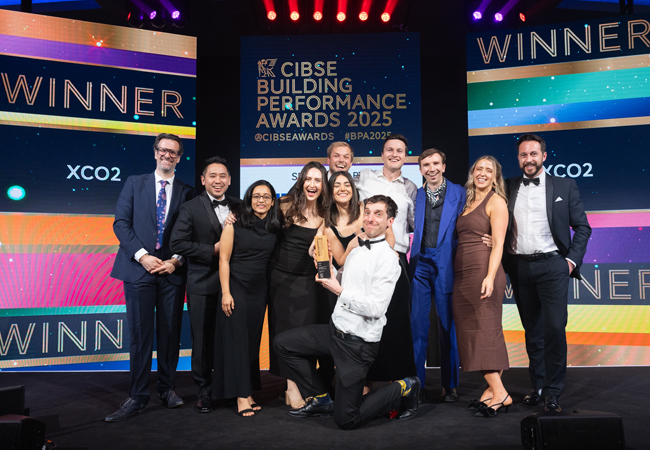
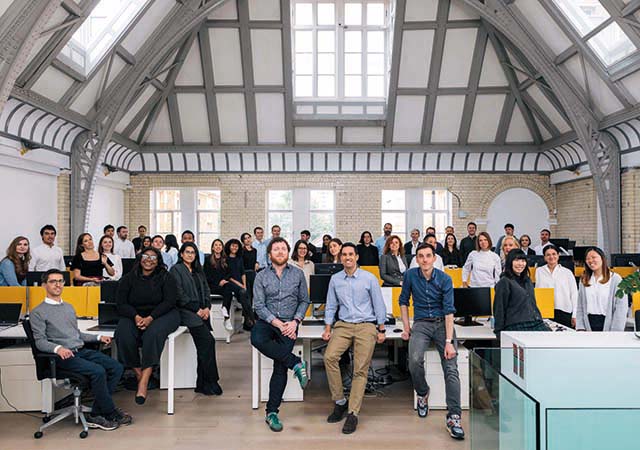
‘A truly global approach to sustainability’ earned XCO2 a record fourth consecutive win. The firm has worked in nearly 50 countries, tailoring designs to diverse climates and communities. Landmark projects include work on a passive-designed monastic school in the Himalayas and assessing climate change risks in the Galapagos.
Among the company’s key efforts are championing net zero, material reuse and social change. Its highlights include AI energy modelling with UCL and pioneering pre-demolition audits for material reuse.
Highly commended: Max Fordham
Building Performance Consultancy (up to 50 employees)
Sponsor: Mitsubishi Electric
Winner: Cyclone Energy Group
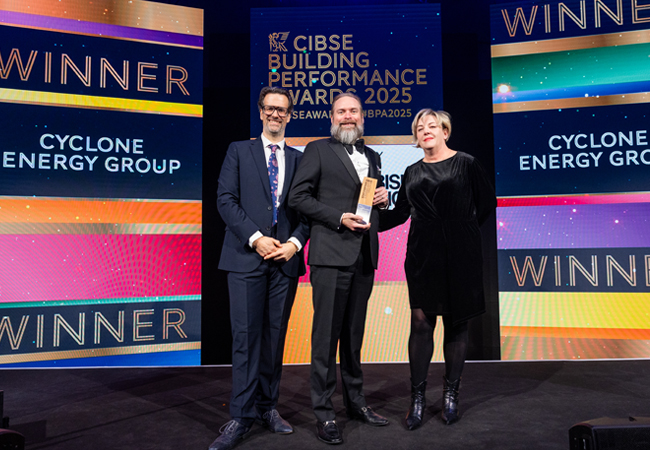
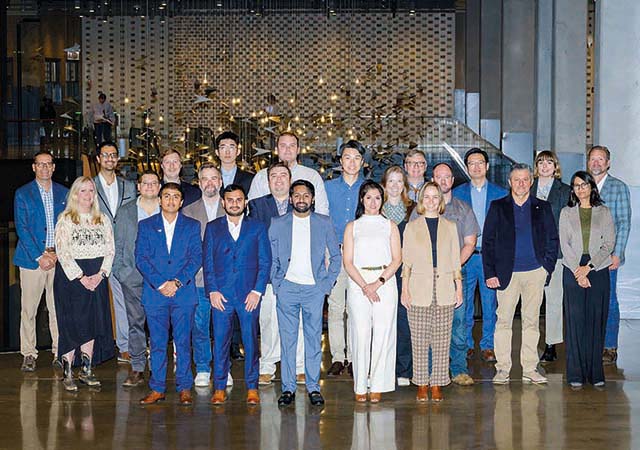
Cyclone Energy Group was praised for its innovative approaches, including its use of geo-exchange systems in two high-rise residential projects – the first of their kind in the US. The company’s post-occupancy evaluation of more than 51 projects was also ‘very impressive for a business of this size’, the judges added, while its impactful outreach, volunteer service day, and efforts to educate architects on decarbonisation also stood out.
The 28-person consultancy optimises building performance across life-cycle stages, using tools such as AI drones and virtual reality. It fosters diversity with blind recruitment and inspires through STEM events.
Product or Innovation of the Year – Air Quality
Sponsor: CIBSE Patrons
Winner: The Pluvo Column – Pluvo
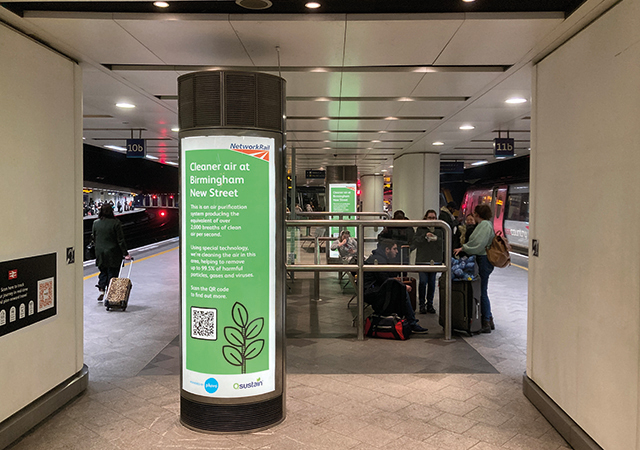
Judges called the Pluvo Column an ‘innovative solution to air quality in transport hubs’, and praised ‘a high-quality submission supported by robust research’.
The 2.7m-tall air purifying system doubles as an LED advertising display. Designed for air pollution hot spots, it filters up to 99.5% of pollutants, creating clean air zones within a 20-60m radius.
The Pluvo has a small footprint, low power draw, and is controlled by internet of things devices for energy efficiency. A six-month trial near London’s North Circular showed significant reductions in pollutants, making it a scalable solution.
Product or Innovation of the Year – Thermal Comfort
Winner: Optimum Air Conditioning System – EcoTechX
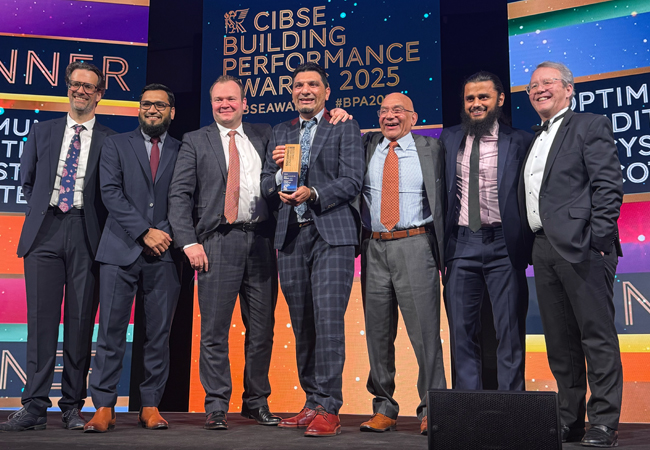
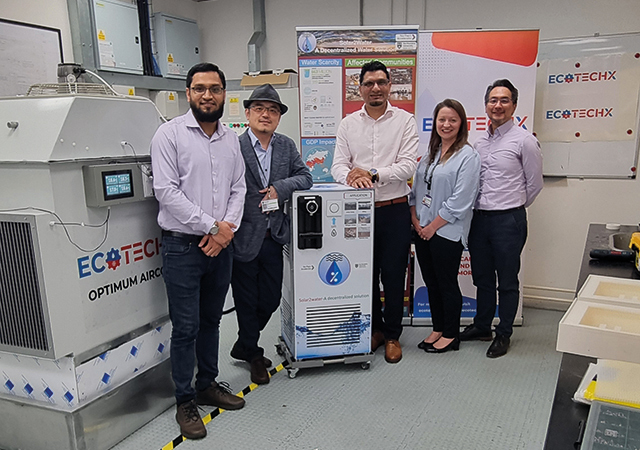
EcoTechX’s air conditioning system ‘demonstrated genuine innovation with broad applicability across property types and use cases’, said the judges.
The novel indirect evaporative cooler (NIEC) uses water’s natural cooling properties, achieving thermal comfort at 22°C without chemical refrigerants or high energy use. Operating via a humidifier and heat exchanger, the NIEC reduces energy consumption by 65% and can cut capital costs by 50%. It integrates with existing systems, boosting efficiency by up to 45%.
Highly commended: Passive Cooling Double-skin Roof – Universidad de Sevilla
Product or Innovation of the Year – Wellbeing
Winner: Nature Connect – Signify
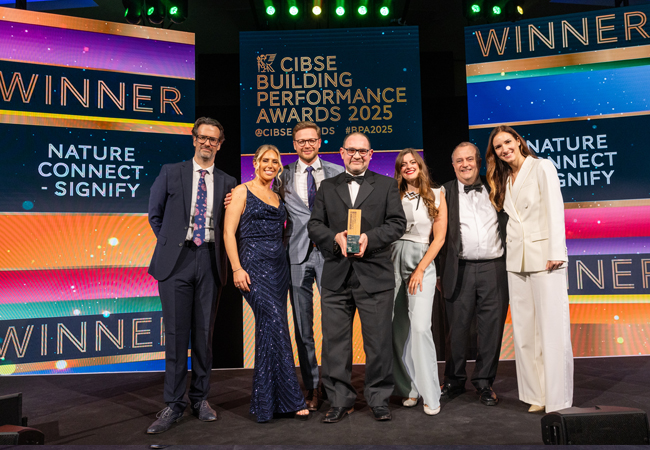
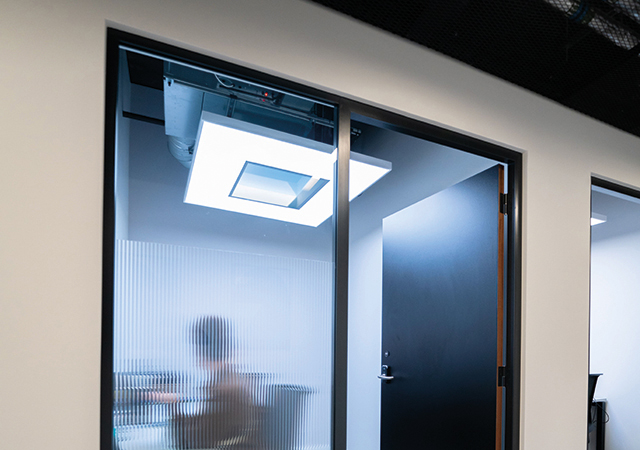
Signify’s NatureConnect earned judges’ praise for its scientifically supported design, addressing the need for enhanced lighting in spaces with limited natural daylight.
The system recreates daylight indoors, mimicking natural light’s appearance and effects. Its dynamic Day Rhythm feature adjusts brightness and colour temperature to align with circadian cycles, boosting mood, productivity and sleep quality.
Meeting EN17037 and Well standards, NatureConnect’s real-world application includes Edge Amsterdam West building and Battersea Power Station’s IWG offices.
Collaboration
Sponsor: CIBSE Life-cycle Carbon Assessment Training
Winner: L&G’s Symphony Model – Legal & General, Demand Logic, Bellrock and partners
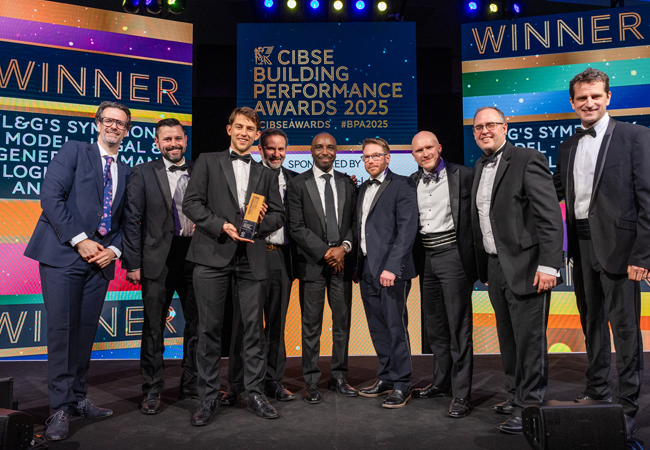
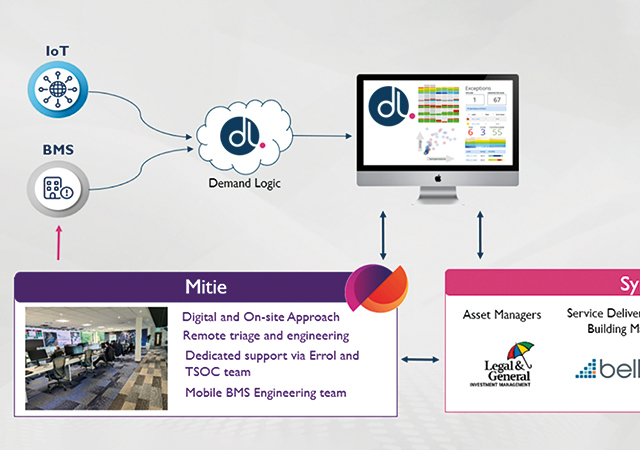
Judges hailed L&G’s Symphony Model as ‘a game-changing tool for optimising building performance’, commended for its collaborative, replicable approach that benefits clients and teams.
This data-driven strategy enhances health, wellbeing, energy efficiency and sustainability. Supported by the Symphony Academy, which trains teams in digital skills, the model uses tools such as Demand Logic to analyse HVAC data, flagging issues resolved via Bellrock’s software. Over six months in 2023, 87.5% of 2,941 incidents were fixed remotely, saving 300,000kWh and £208,450. The model aims to cover L&G’s full portfolio.
Best Digital Innovation – Project Delivery
Winner: Sydney Airport International Terminal T1 chilled water plant optimisation – A. G. Coombs Group, Exergenics
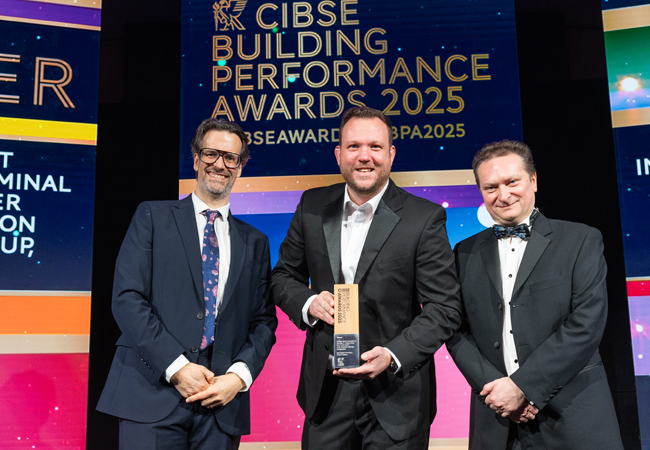
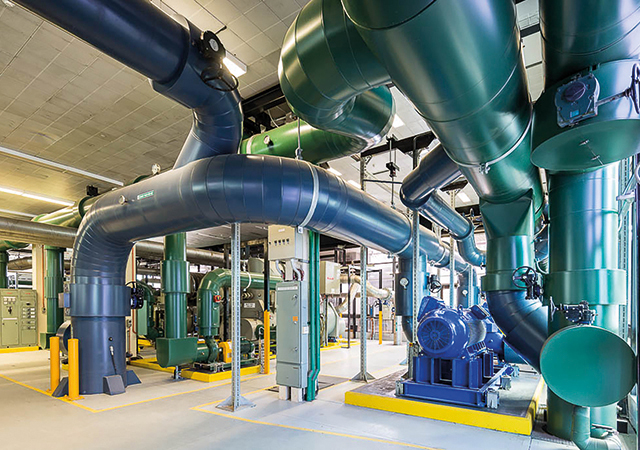
Sydney Airport, with A. G. Coombs and Exergenics, optimised Terminal 1’s chilled water plant using advanced machine learning and predictive control.
They enhanced chiller, pump and cooling tower efficiency through measures such as dynamic condenser water resets and demand-based setpoints. The project reduced energy consumption by 890,094kWh, cut GHG emissions by 704tCO2 and achieved energy cost savings of $124,600 (£98,000) over nine months.
Highly commended: Paper Trails to Digital Triumphs – Savills
Best Digital Innovation – Organisational Strategy
Winner: Cyclops – Foster + Partners
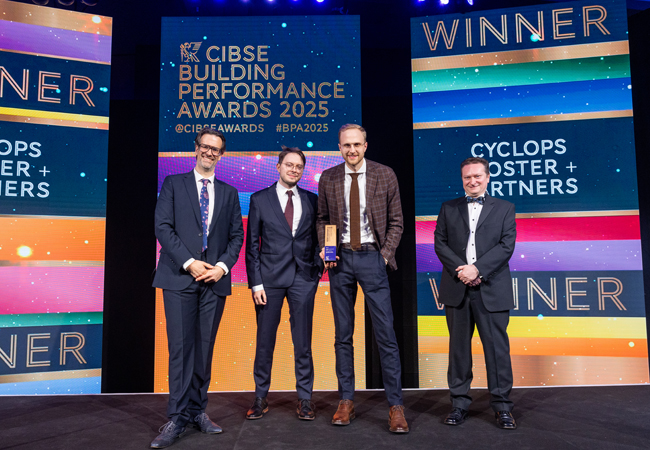
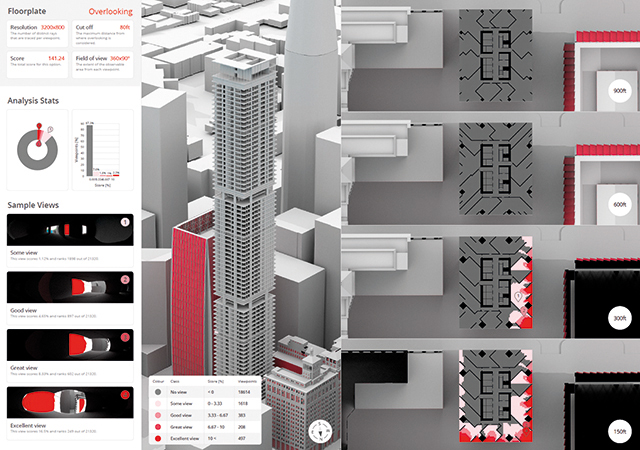
The judges said Foster + Partners’ software tool Cyclops has the potential to revolutionise the way software is used in our industry.
Cyclops integrates real-time environmental simulations into the design process, addressing time-consuming cycles and interoperability challenges. The tool supports 17 types of analysis, including daylight metrics, sunlight hours and radiation. It is up to 10,000 times faster than traditional tools, reducing project analysis turnaround from days to hours. Judges praised its user-centric approach, and potential to transform data accessibility and decision-making.
Client of the Year
Winner: London Borough of Islington (LBI)
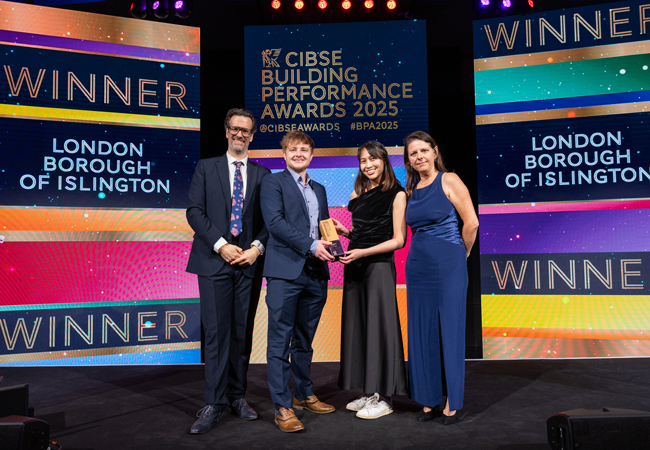
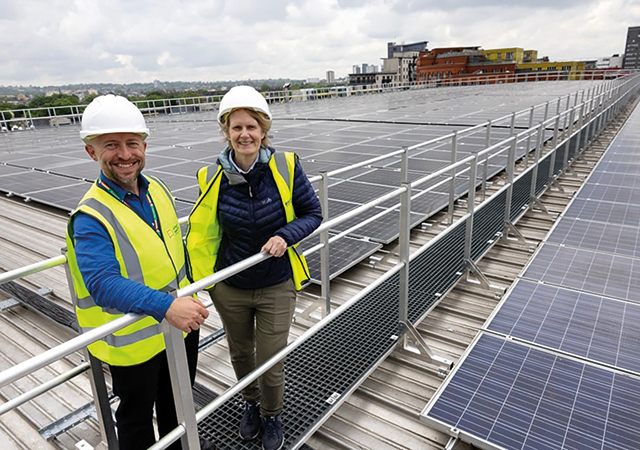
LBI’s ‘comprehensive approach to decarbonisation, social values and energy performance metrics’ earned praise from the judges, who highlighted the borough’s drive for a ‘more equal future’.
Its Net Zero 2030 vision includes the delivery of more than 50 projects such as the Waste Recycling Centre redevelopment, with full electrification, 852 solar panels generating 348,658kWh, and 92.5% construction waste recycling. Its collaborative efforts prioritise efficiency and emissions reduction, aided by tools such as Navigator.
Community initiatives raised £13,000 for charities and supported schools, and LBI shares expertise via events, case studies and Salix bulletins.
Leadership
Winner: Swire Properties
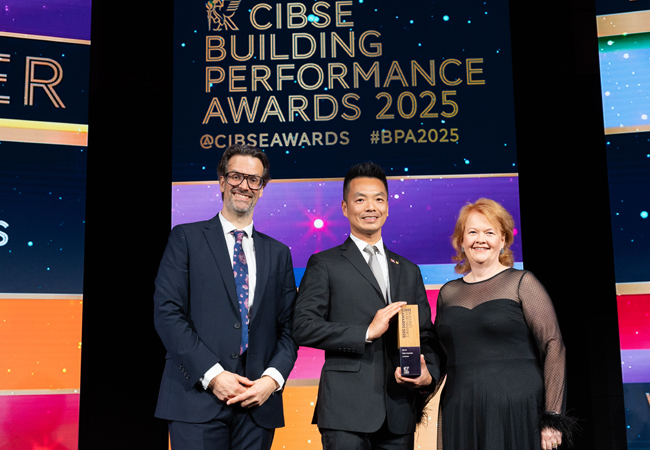
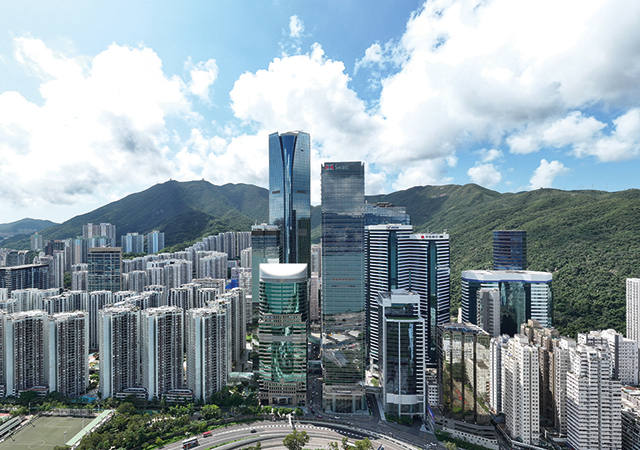
Swire Properties’ ‘demonstration of global leadership’ – notably through research with leading academics on embodied and whole life carbon metrics – impressed the judges. Its portfolio spans Hong Kong, Chinese Mainland, Southeast Asia and the US, and encompasses 24.4 million sq ft of mixed-use developments.
The company’s 1.5°C-aligned Science Based Targets led to a 29% reduction in Scope 1 and 2 emissions, and a 40% drop in Scope 3 carbon intensity by 2023, surpassing its 2025 goals. Key initiatives such as Two Taikoo Place achieved a 17% reduction in embodied carbon. Swire also contributes to global sustainability frameworks.
Highly commended: Andy Jackson, head of Central London operations and UK engineering – Savills
Learning and Development
Sponsor: BCIA
Winner: The ZERO Teaching and Internship Programme on zero carbon energy buildings – ZERO Institute, University of Oxford
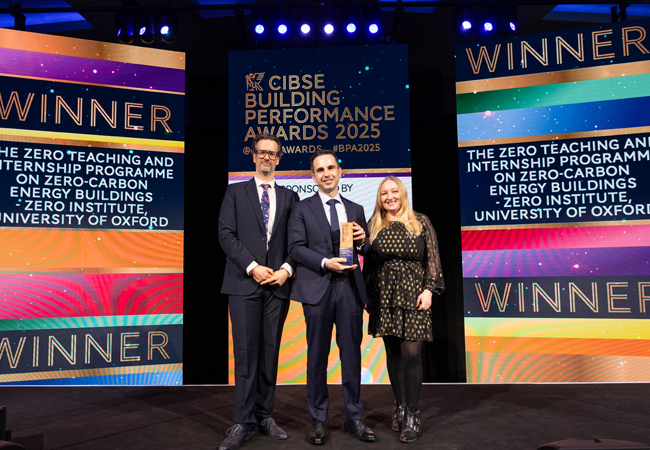
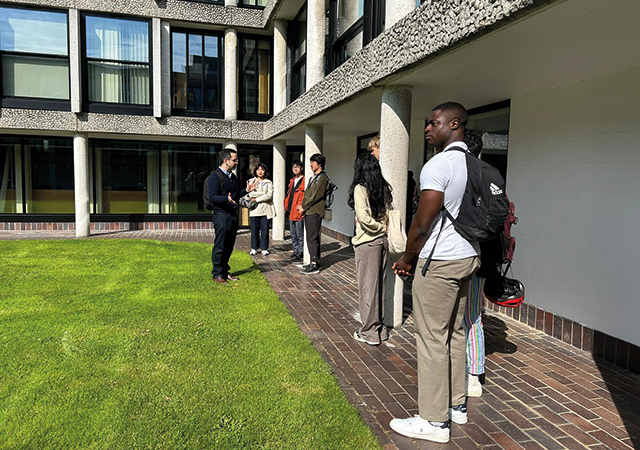
The ZERO Internship Programme combines advanced teaching with real-world projects to drive Oxford’s net zero transition. Judges praised its potential to operate in more cities and communities, and noted overwhelmingly positive student feedback.
Led by Professor Jesús Lizana, the programme trains future MEP engineering leaders through degree courses, summer schools and internships. Launched in May 2024, it cut an estimated 5,395.5kgCO₂e in its first year.
Highly commended: Building Safety Act training and assessment – Hoare Lea
CIBSE Embodied Carbon Award – Products and Systems: for Manufacturers and Suppliers
Sponsor: CIBSE Certification Ltd
Winner: Apollo Fire Detectors
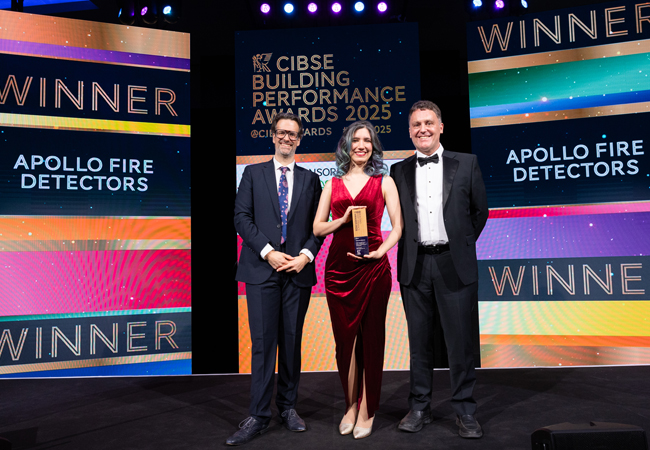
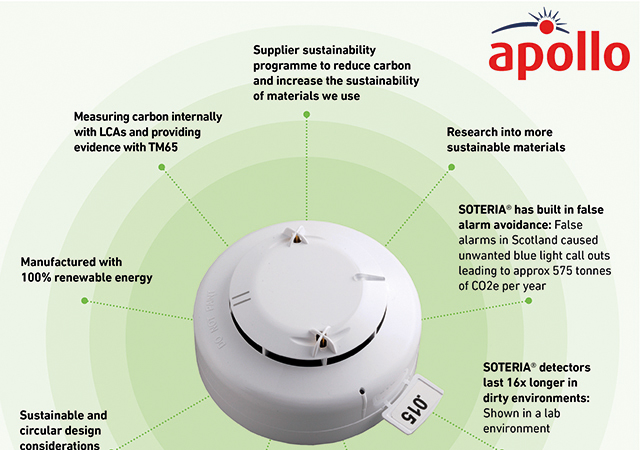
Apollo Fire Detectors won for its efforts to measure and reduce embodied carbon in its products. The company assessed nearly 100 products using CIBSE TM65, completed life-cycle assessments for 32, and is finalising Environmental Product Declarations for four.
Product redesigns have achieved significant reductions and manufacturing improvements have lowered embodied carbon by 114,453kgCO₂e over a building’s life. Apollo’s dissemination of data advances industry knowledge and emphasises collaborative system design for carbon reduction.
CIBSE Embodied Carbon Award – Services and Projects: for Consultants
Sponsor: CMR
Winner: Q Sustain
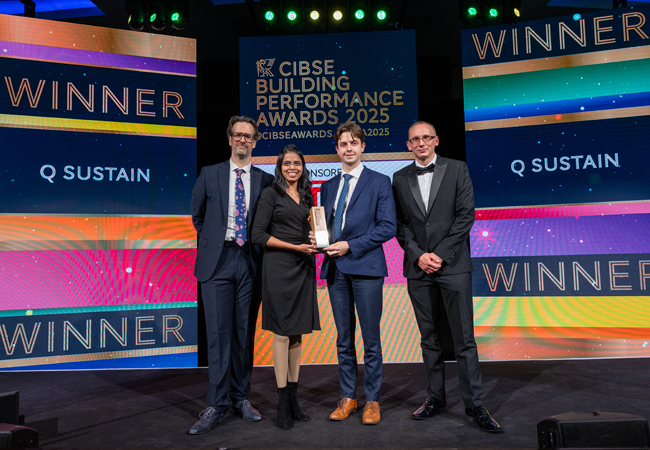
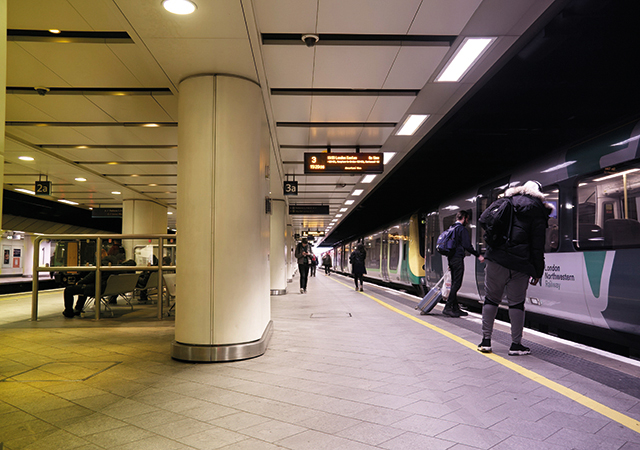
The judges commended Q Sustain for ‘providing clear, quantifiable evidence of the added value and whole life carbon reductions achieved’ through its retrofit of the lighting at Birmingham New Street Station.
Tasked with replacing 891 fluorescent lights, Q Sustain instead retrofitted luminaires by replacing gear trays, reducing material use and embodied carbon. This saved 163 tonnes of CO₂e (39% of whole life emissions) and cut annual energy use by 67 tonnes of CO₂e. The retrofit enhanced lighting quality by 150%, minimised disruption, and future-proofed the system.
Highly commended: Aecom
Facilities Management
Sponsor: Gratte Brothers Group
Winner: 20 Fenchurch Street – Savills
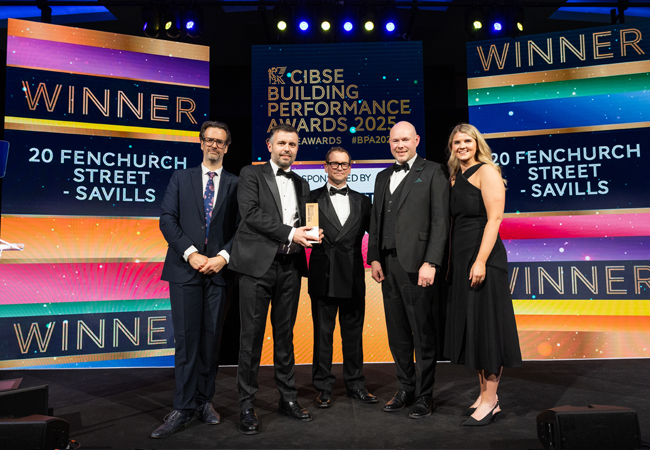
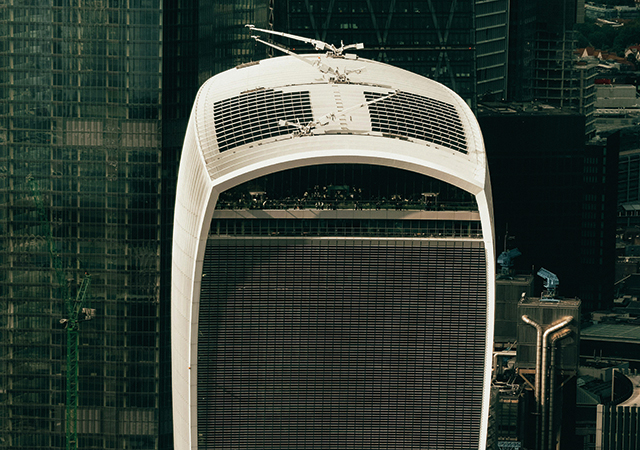
Savills won for its energy-saving achievements at 20 Fenchurch Street. The judges recognised how ‘a proactive approach to FM can yield dividends over a relatively short timeframe’. In 2023, gas consumption fell by 10.6%, electricity by 5.3%, and water use by 21.8%, despite occupancy increasing by a third. Carbon emissions were reduced through recommissioning systems, optimising controls and engaging occupants.
Project Go Dark cut lighting use, while an ‘energy Strava’ tool ranked tenant energy performance anonymously. Recycling exceeded 75%, and the team is aiming for Breeam Outstanding In Use certification.
